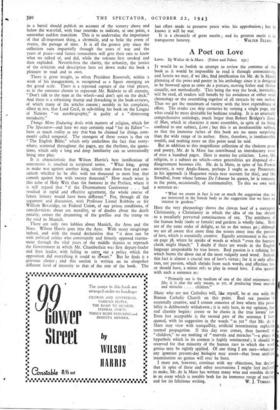A Poet on Love
Love. By Walter de la Mare. (Faber and Faber. 25s.) IT would be as foolish to attempt to review the contents of this book as it would be impossible to read it through consecutively, and herein we may, if we like, find justification for Mr. de la Mare's planning of the prose and poetry in his anthology since it is designed to be browsed upon as cows do a pasture, moving hither and thither casually, not methodically. This being the way the book, inevitably, will be read, all readers will benefit by his avoidance of either strict chronology or the assembling together of all extracts by one author. Thus we get the maximum of variety with the least expenditure of effort. The reader can skip centuries by turning a single page, and what could be more desirable for bedtime reading. It is an unusually comprehensive anthology, much larger than Robert Bridges's Spirit of Man, which in character it most resembles, in spite of its being confined to one subject, Love - but this is an inexhaustible subject, so that the immense riches of this book are no- more surprising than the wide range of its author. Here, therefore, is inexhaustible wealth, and nothing more on this point need be said. But in addition to this magnificent collection of the choicest prose and poetry,• Mr. de la Mare has contributed an introductory essay of over a hundred pages. Here is matter for criticism. Love, like religion, is a subject on which—once generalities are disposed of— disagreement becomes rife. Mr. de la Mare, in spite of his French ancestry, is very Anglo-Saxon, perhaps I ought to say Protestant, in his approach (a Huguenot strain may account for this), and like Stendhal, from whose famous De l'Amour he quotes, he is romantic to the point, occasionally, of sentimentality. To this we owe such a sentence as:
" What we resent in fact is not so much the suggestion that we are interested in the female body as the suggestion that we have no interest in gardens."
Here the very phraseology shows the cloven hoof of a corrupted Christianity, a Christianity in which the idea of sin has shrunk -to a peculiarly perverted consciousness of sex. The antithesis of the human body (male or female) and gardens is wholly false.. Both are of the same order of delight, as far as the senses go . although we are all aware that more than the senses enter into die passion of love, which is essentially creative. Equally sentimental is his note on page 38, where he speaks of words at which " even the horniest cheek might blanch." I doubt if there -are words in the English language unspeakable by true lovers. Real passion is a refining fire which burns the dross out of the most vulgarly used word. Indeed, this fact is almost a crucial test of love's virtue ; for it is only affec- tion, not passion, which shrinks from such words, and affection has, or should have, a minor role to play in sexual love. I also quarrel with such a sentence as: " Primarily sex is the medium of one of the chief .enjoyments of life; it is also the only means, as yet, of producing 'those marvels . and miracles . . . . children."
Many who are not Catholics will, like myself, be at one with the Roman Catholic Church on this- point. Real sex passion 'is essentially creative, and I cannot conceive of love where this possi- bility is deliberately withdrawn ; it is only here, in my opinion, that real chastity begins: create or be chaste is the true lovers' law. Even less acceptable is the second part of the sentence I have quoted, with its suggestion in the words "as yet" that Mr. de 13 Mare may view with tranquillity, artificial insemination replacing normal propagation. If this day ever comes, then farewell to " children," 'to say nothing of " marvels and miracles "—a piece of hyperbole which in its context is highly sentimental ; it should be, reserved for that minority of the human race to which the word genius may be rightly applied. Of one thing I am sure—whatever any ignorant present-day biologist may assert—that from artificial insemination no genius will ever be born.
I must not, however, continue with my objections, but declare that in spite of these and other reservations I might feel inclined to make, Mr. de la Mare has written many wise and sensible things in an essay which is notable both for its immense range of reading


























 Previous page
Previous page